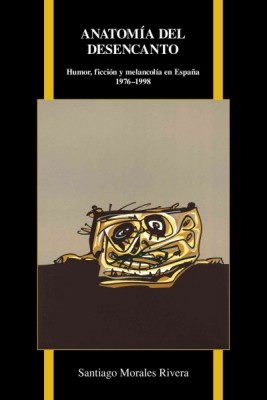| Anatomía del Desencanto: Humor, Ficción Y Melancolía En España (1976-1998) Contributor(s): Morales Rivera, Santiago (Author) |
|
 |
ISBN: 1557537682 ISBN-13: 9781557537683 Publisher: Purdue University Press OUR PRICE: $44.55 Product Type: Paperback - Other Formats Language: Spanish Published: February 2017 |
| Additional Information |
| BISAC Categories: - Literary Criticism | European - Spanish & Portuguese - Literary Criticism | Humor - Literary Criticism | Modern - 20th Century |
| Dewey: 863.609 |
| LCCN: 2016013430 |
| Series: Purdue Studies in Romance Literatures |
| Physical Information: 0.7" H x 6" W x 9" (1.50 lbs) 200 pages |
| Themes: - Chronological Period - 20th Century |
| Descriptions, Reviews, Etc. |
| Publisher Description: Tras la derrota de los soixante-huitards, el colapso del comunismo europeo y la ca da tambi n en torno a 1989 de varias dictaduras y revoluciones en Am rica Latina, el acercamiento sentimental a la historia vuelve a cosechar xitos entre las humanidades y las ciencias sociales y pol ticas. En el mbito hisp nico, este giro afectivo lleva camino de reproducir otro fin de si cle como el que ya protagonizaron los intelectuales de 1898. Un siglo despu s, tanto en las universidades espa olas como en las anglosajonas nociones como desencanto, trauma, memoria, y empat a informan pr cticamente todos los an lisis de la cultura espa ola moderna, desde la sanguinaria guerra civil y los casi cuarenta a os de fascismo hasta la decepcionante transici n a la democracia. Santiago Morales interviene en este acercamiento sentimental a la historia y a la novel stica de la transici n, recuperando los v nculos y tensiones que mantiene la noci n de melancol a con la est tica del humor negro en un corpus de obras de ficci n escritas entre 1976 y 1998. Mediante una metodolog a que alterna entre el an lisis cuidadoso de novelas de Javier Mar as, Gonzalo Torrente Ballester, Cristina Fern ndez Cubas y Juan Jos Mill s, y el distant reading o el encuadre que coloca estos textos en una historia m s amplia, Anatom a del desencanto hace una cr tica del lugar equ voco que ocupan en nuestra modernidad sentimientos en otro tiempo tan nobles y obstinados como el duelo, el miedo, la culpa, y la compasi n. Mientras que otros estudiosos de la transici n abundan en denunciar la persistencia ominosa del franquismo y la posguerra, Santiago Morales ve en el humor negro de la melancol a una f rmula profundamente ir nica: un catalizador en el crecimiento creativo y moral de la narrativa espa ola y una herramienta cr tica fundamental para cambiar la educaci n sentimental contempor nea. Escrito en espan l. After the failure of the soixante-huitards, the collapse of European communism, and the fall around 1989 of various dictatorships and revolutions in Latin America, the sentimental approach to history is again reaping successes among the humanities and the social and political sciences. In the Hispanic world, this affective turn is on its way to repeating another fin de si cle like the one led by the intellectuals of 1898. A century later, in both Spanish and Anglo-Saxon universities, notions such as disenchantment, trauma, memory, and empathy inform virtually all the analyses of modern Spanish culture, from the bloody Civil War and the nearly forty years of fascism that followed it to the disappointing transition to democracy. Santiago Morales intervenes in this sentimental approach to history and to the novelistic production of the transition by recovering the links and tensions that the notion of melancholy maintains with the aesthetics of black humor in a corpus of fictional works written between 1976 and 1998. Through a methodology that alternates between the careful analysis of novels by Javier Mar as, Gonzalo Torrente Ballester, Cristina Fern ndez Cubas, and Juan Jos Mill s, and the distant reading or framing that places these texts in a broader history, Anatom a del desencanto constructs a critique of the equivocal place held in our modern age by feelings that were, in another time, so noble and persistent, such as grief, fear, guilt, and compassion. While other specialists who study the transition today agree in denouncing the ominous persistence of Francoism and the postwar ethos, Santiago Morales sees a deeply ironic formula in the black humor of melancholy: a catalyst in the creative and moral growth of Spanish narrative and a fundamental critical tool to change contemporary sentimental education. Written entirely in Spanish. |